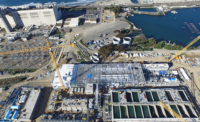However, Mansfeldt notes that Watersolutions AG, which has one full-scale plant in Egypt with a capacity of 500 cu m per day, is promoting the low-temperature distillation (LTD) technology in the market to mitigate high energy consumption and pollution levels.
The technology not only cleans seawater—with a very high conversion ratio of 70% to 80% compared to about 40% for other technologies—it also cleans the brine from existing desalination plants as well as polluted water from industrial processes and from oil and gas exploration.
“The high conversion ratio means there is less water intake/discharge,” Mansfeldt says, adding that the LTD design and the low risk of fouling have enabled plants to “operate with no or very little anti-scalants, thus significantly reducing the amount of chemicals discharged.”
International Desalination Association President Corrado Sommariva sees a gradual and steady increase in demand for freshwater in Africa. He says, “[Freshwater] will be the key requirement to enable an improvement in social and living conditions as well as in driving the main economic aspects.”
“The possibility of making [freshwater available through desalination] in a sustainable manner, both socially and economically, could be a great potential for the market in the region and, in general, to maintain political stability and economical growth,” Sommariva adds.
Sommariva says North Africa and, in particular, Algeria have introduced desalination on a grand scale. Although countries such as Sudan and Namibia have shown great interest in the technology, over 90% of the desalination market share in Africa “is concentrated in Algeria, whose market share can be estimated in the range of 15% of the overall market.”



